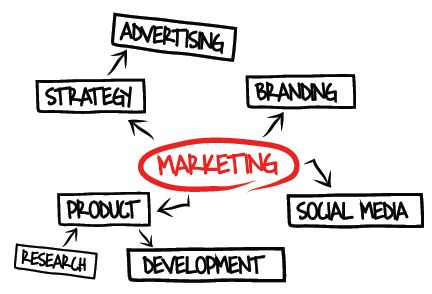10. Avoiding Social Media
If a business isn’t on Facebook, Instagram, Twitter and the like, how do they expect today’s consumer to find them? Social norms today include following, liking and friending businesses to get exclusive offers and feel like a personal relationship is formed between businesses and customers. With visual content on the rise and showing no signs of slowing down, posting image-based and thought-provoking messages will keep followers engaged and interactive.
9. Not Having a Website
Many businesses are under the assumption that a social media presence without a website presence does the trick. While social media is essential, a website is more crucial, as it is the ultimate place that social media traffic is directed to. A well-designed, neatly organized website that is easy to navigate is an essential part of marketing.
8. Missing the Boat on Branding
Branding is often overlooked when businesses first start up, but in reality, this is one of the most important parts – if not the most important part – of starting a business. Branding involves more than just a logo, colors and name – branding means coming up with a story, values and brand promise. As an example, Jimmy John’s logo is “Freaky Fast Delivery.” The stores carry out their fast service in all aspects of the sense, including quick preparation of sandwiches and quick delivery. You must develop the brand and then promote it every way and any way you can. And don’t forget to protect it with trademarks and patents.
7. Not Developing a Plan
“Failing to plan is planning to fail” holds true particularly when it comes to a marketing plan. A marketing plan is crucial to the start of a business, and it should continue being reviewed and revised for years to come.

Conduct a SWOT analysis of the market to discover the strengths, weaknesses, opportunities and threats that your business faces. From this analysis, discover what your business’s unique identity is in your target market. Continually track and measure progress, forecast sales and follow budgets to stay relevant to your plan.
6. Not Focusing on a Target Audience
A SWOT analysis is an ideal time to discover your target audience. However, that audience can change over time, so it’s important to continue assessing who your target customers are. Many businesses fail to focus on one specific segment by not understanding the needs of their demographic. Be sure your target audience is identified and you are marketing directly to that audience.
5. Not Paying Attention to Details
We’ve all caught a glimpse of spelling and grammatical errors in advertisements, magazines, billboards and the like. These types of mistakes give off an unprofessional vibe for businesses. Although small, these details make a big impact, so be sure any marketing efforts go through many rounds of edits before being published.
4. Underestimating the Value of Your Current Customers
According to Bain and Co., a five percent increase in customer retention can increase a company’s profitability by 75 percent. Creating relationships with current customers ensures that they come back; it also assures they will speak positively about your business to others, often generating new business. Offer current customers exclusive promotions and engage them through social media. Not only listen to their feedback, determine how you can implement it to better the experience for everyone.
3. Not Standing Out in a Saturated Market
In a business marketing plan, it’s important to find a unique identity for the business in its respective market. In today’s world, there are many industries with saturated markets and businesses can get lost. Businesses must ensure that they find a unique selling point that will make them standout above all the noise. Part of standing out is not cutting corners. When a new shop opens you may lose some customers temporarily due to the excitement of something new, but if you maintain what you do, and do it well, they always come back.
2. Not Getting Personal with Customers
Once you’ve understood the value of your customers, you must find a way to connect with them on a personal level. Connect on a personal level with them through social media, but also carry it out through customer service in the store. Treat each person that walks through the door as a friend, getting to know their name and their needs. Consumers want to go where everyone knows their name.
 1. Not Understanding the Importance of Marketing
1. Not Understanding the Importance of Marketing
Last but not least, not understanding the importance of marketing as a whole is a major mistake many businesses make. Many people have the false notion that they don’t need marketing to attract business. At the end of the day, if no one knows you exist how do you expect them to walk through the door? Understand that marketing is an essential strategy for any business, big or small, and the more thought, time and effort put into it, the greater results you will see.



